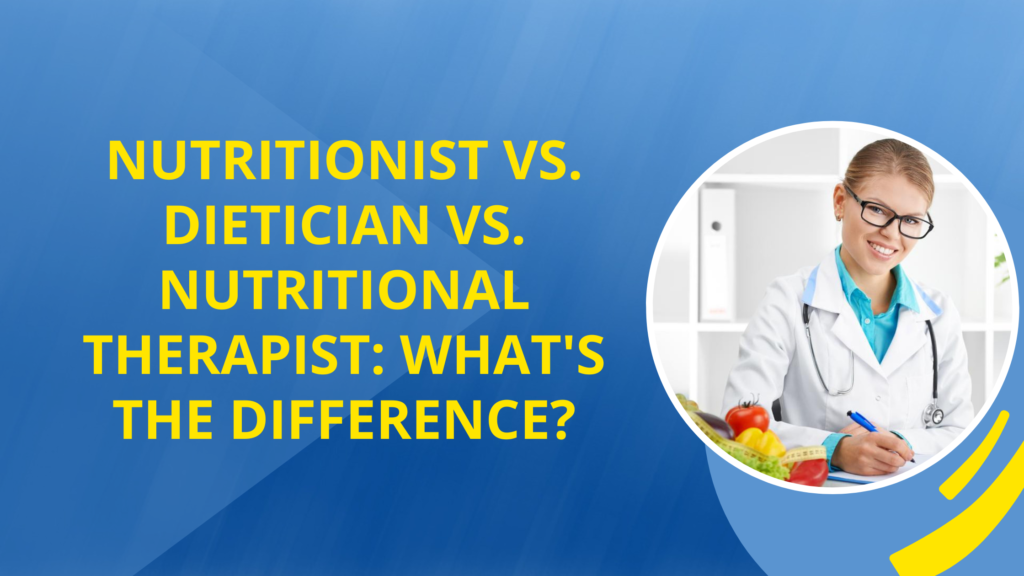Table of Contents
Introduction
Nutrition is an important part of our overall health and well-being. But with so many different nutrition professionals out there, it can be difficult to know who to see for advice. In this blog article, we will discuss the three main types of nutrition professionals: nutritional therapists, nutritionists, and dieticians. We will explain the similarities and differences between these three professions, as well as the educational requirements, scope of practice, and professional organizations associated with each one. We will also provide tips for choosing the right nutrition professional for your needs.
What are the Different Types of Nutrition Professionals?
The terms “nutritional therapist”, “nutritionist”, and “dietician” are often used interchangeably, but there are actually some key differences between these three professions.
Nutritional Therapists
Nutritional therapist typically have a background in holistic health and alternative medicine. They use a variety of techniques to help people improve their health, including diet, lifestyle changes, and supplements.
Nutritional therapists are very similar to dieticians in the fact that they are trained to assess an individual’s symptoms and review their diet to see what vitamins or minerals that they may be deficient in, and suggest a diet that may help support their particular problem.
Nutritional therapists are able to advise on a whole range of health conditions ranging from relatively minor issues such as dry skin, insomnia, or fatigue to more serious health complaints such as inflammatory bowel disease, arthritis, or depression. They seek to find the root cause of the problem and suggest both dietary and, sometimes, supplements to help support the body’s systems to allow the body to help itself. Consultations are on a one-to-one basis so they can really discover the client’s individual circumstances and tailor-make a program just for them.
Nutritionists
Nutritionists are different because they typically work in food companies, research or food-related industries, and aren’t trained to see individuals to assess particular issues. Their training is more for advising on food products, food labels, or researching nutritional effects on our bodies. They are usually scientists.
Dieticians
Dieticians have a master’s degree in dietetics or a related field. They are qualified to diagnose and treat medical conditions related to diet, and they can also provide general nutrition advice.
What is Nutritional Therapy?
Quite simply, it is looking at the symptoms you have, the food you eat and correlating the two to determine what your body needs to help optimize your health.
We are all different, our guts are as unique as our hair and eye color so, just because one of us is okay to eat something, doesn’t mean that we all can.
We need to work out what our body needs more of or less of than other people. And the way to do that? An assessment with a qualified Food Physio™ nutritional therapist who would examine your symptoms and assess the nutrients in which you are most likely deficient in. The therapist will then work to support your body by giving it the right food and maybe suggesting supplements to enhance your body’s nutrient levels.
What does a Nutritional Therapist do?
A Nutritional Therapist is trained to look at health-related symptoms, and determine if these are caused, or made worse by, deficiencies in certain vitamins and minerals. These could include a range of symptoms from dry skin or a rash to fatigue, insomnia, stomach pains and much more. Therapists aim to find the root cause of a symptom or diagnosed condition, and treat it through dietary changes or the introduction of vitamin or mineral supplements, as required. A Dietician is also trained to assess symptoms, but they tend to concentrate more on helping someone with a pre-diagnosed condition such as diabetes or obesity, and often see patients or clients that have been referred by their GP or healthcare professional.
How to Choose the Right Nutrition Professional
When choosing a nutrition professional, it is important to consider your needs and goals. If you are looking for general nutrition advice, a nutritionist or registered dietitian may be a good option. If you have a specific medical condition or are looking for more holistic treatment, a nutritional therapist may be a better choice.
Conclusion
In this blog article, we have discussed the three main types of nutrition professionals: nutritional therapists, nutritionists, and dieticians. We have explained the similarities and differences between these three professions, as well as the educational requirements, scope of practice, and professional organizations associated with each one. We have also provided tips for choosing the right nutrition professional for your needs.
We hope this information has been helpful. If you have any further questions, please feel free to contact us.

